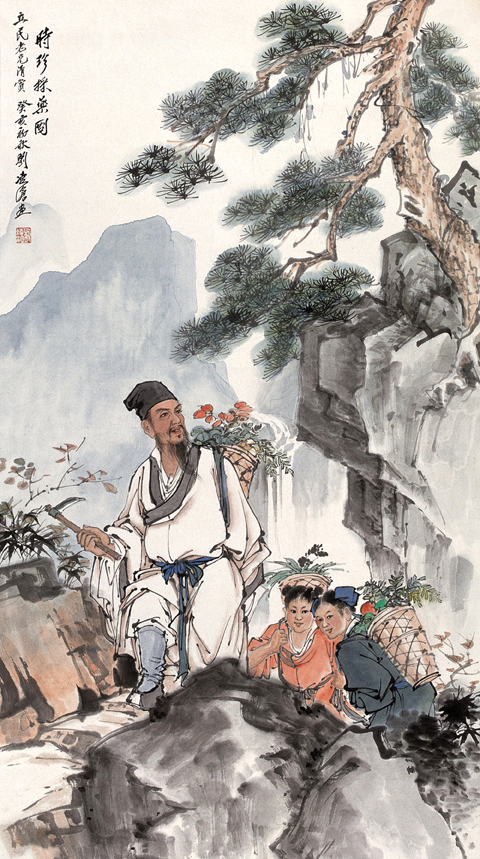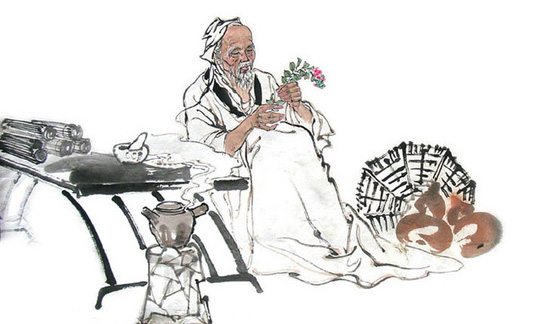Learning From China
Researchers are finding that traditional Chinese medicine may have a lot to offer
Anne Underwood

If traditional Chinese medicine feels unscientific to the Western mind, that should come as no surprise. Its foundations sere laid down more than 2,000 years ago in The Yellow Emperor's Classic of Internal Medicine. Yet modern science is starting to verify that some of these age-old remedies really work. A major conference in Beijing in September brought together 1,500 researchers from 28 countries. Together the scientists presented more than 1,000 research papers, most of them relying on strict Western rules of evidence to evaluate the safety, efficacy and biological mechanisms of traditional Chinese treatments. The beauty of the research is that it seems strongest in areas where Western medicine is weakest¡ªnamely, chronic illness. "Even in China, no one says 'Get me to an herbalist' after a car crash," says Dr. David Eisenberg, director of Harvard Medical School's Osher Institute for complementary and integrative medicine. But the Chinese do routinely seek out traditional cures for recurring migraines, arthritis, menopausal symptoms, chronic digestive disorders, even inoperable cancers. The evidence is promising enough that Western researchers have begun looking to China for potential new therapies.
That the two systems can find common ground for dialogue at all is remarkable. Traditional Chinese medicine is grounded not in biochemistry or pathology but in concepts of balance and harmony¡ªbetween Yin and Yang, the "five elements" (wood, fire, earth, metal and water), the "six pathogenic factor" (cold, wind, dryness, heat, dampness and fire) and the "seven emotions" (joy, anger, anxiety, obsession, sadness, horror and fear). Excesses or deficiencies can cause illness, according to Chinese medical theory. So can too much or too little food, drink, work or exercise . In addition, good health requires the life force or vital energy that the Chinese call qi ("chee") to flow smoothly through the body along 14 major channels, or "meridians". Put this all together, and it means that a traditional Chinese doctor wouldn't diagnose peptic ulcers, but "deficient yin of the stomach," "damp heat affecting the spleen" or disharmony of the liver invading the spleen." Acupuncture or herbs might be needed to unblock "stagnant qi".
Of all the Chinese treatments, acupuncture has been the focus of the most research in the West. It has been tested, with mixed results, for conditions ranging from asthma to ringing of the ears. So far, the strongest evidence is that it relieves pain and nausea. Numerous lines of research show that it boosts levels of the body's own opiates called endorphins. This would help explain its effect on pain. It also appears to increase the brain chemical serotonin, which confers a sense of well-being. At the September conference, Dr. Han Jisheng of Beijing University presented a study suggesting that acupuncture could even lessen drug cravings. In a study of 611 Chinese heroin addicts in rehab, acupuncture with low level electrical stimulation reduced the relapse rate to less than 80 percent after nine months¡ª compared with nearly 100% for most Chinese addicts.
What's most puzzling is why the 2,000 acupuncture points on so-called meridians should be special. Western doctors have long complained that the meridians don't correlate to any anatomical structure, such as nervous system. But Dr. H¨¦l¨¨ne Langevin from the University of Vermont may have found the key. In December the journal of the American Association of Anatomists, The Anatomical Record, will publish Langevin's cutting-edge research showing that acupuncture points tend to correspond to areas where connective tissues are thickest. "Connective tissue forms a web that runs continuously through the body," she says. This tissue also contains many nerve endings, which may explain why a needle in the right hand would affect the left shoulder.
Chinese herbology presents its own set of research challenges. Western trials are set up to study a single medication. But Chinese remedies are blends of many herbs. "Chinese medicine is not like a tennis match with two opposing players¡ªdisease and drug,"says Lu."It's more like a football game, with many types of players in different roles." Some herbs might be star quarterbacks; others might tackle toxic side effects. It may be the combination of herbs or their subcomponents that makes them effective. Take the herb huang lian, which Dr. Gary K Schwartz at Memorial Sloan-Kettering Cancer Center is studying as a potential cancer treatment. The herb contains seven main compounds and 30 minor ones. Together, they kill cancer cells in the lab by interfering with the cells' development. Individually, the compounds don't have the same activity.
Chinese medications tend to have fewer side effects than Western pharmaceuticals, but they are not risk-free. Anything strong enough to have pharmacological activity also carries the risk of toxicities, notes Ted Kaptchuk, a doctor of East Asian medicine who teaches at Harvard Medical School. In 1996, Australian researchers surveyed the most populous states in their country for adverse effects from both herbs and acupuncture. They noted one adverse event for every eight to nine months of a doctor's full-time practice, or one problem per 633 consultations. The problems with herbal medicines included allergic reactions and interactions with prescription drugs. Elsewhere, toxic impurities and incorrectly mixed herbs have sometimes resulted in kidney failure and even death. Still, Western medicine, for all its efficacy and high standards of purity, is riskier. A 1998 study in the Journal of the American Medical Association found more than 100,000 fatal drug reactions among patients in U.S. hospital in a single year.
Chinese medicine seems likely to find a growing place in Western medical practice, if only due to popular demand. Americans and Europeans are increasingly asking for it¡ªeven traveling to China to get it. One traditional hospital in Beijing has a special foreigners' ward. Other Chinese hospitals are offering medical tour packages. "You can see the Great Wall, the Forbidden City¡ªand get three days' worth of treatment as well," says Yianni Solos, a Greek medical student in Beijing. For those not ready to make the journey, China is exporting $500 million worth of herbal medicines annually. And since 1987, more than 20,000 Westerners have studied in traditional Chinese Medical academies. Equally important, training programs now exist in West, along with licensing procedures for qualified practitioners. The result: more Chinese medicine is available stateside.
 Those seeking it out include people like research scientist Amy Howell of Rutgers University. After suffering from West Nile virus two years ago, Howell began having serious dissy spells. Western specialists told her the cause was "probably multiple sclerosis or a brain tumor," but they were unable to fix the problem. Finally, in desperation, she turned to an acupuncturist in Cherry Hill, N.J. He diagnosed "stagnant liver qi" and administered acupuncture and herbal remedies. Seven months later Howell's dizzy spells are gone. So are her allergies and a chronic shoulder problem. "I'm a scientist," says Howell. "This doesn't make sense, but there's something there".
Those seeking it out include people like research scientist Amy Howell of Rutgers University. After suffering from West Nile virus two years ago, Howell began having serious dissy spells. Western specialists told her the cause was "probably multiple sclerosis or a brain tumor," but they were unable to fix the problem. Finally, in desperation, she turned to an acupuncturist in Cherry Hill, N.J. He diagnosed "stagnant liver qi" and administered acupuncture and herbal remedies. Seven months later Howell's dizzy spells are gone. So are her allergies and a chronic shoulder problem. "I'm a scientist," says Howell. "This doesn't make sense, but there's something there".
If Chinese medicine can help complications of West Nile virus, can it work for insomnia? The jury is out, but I'm optimistic.